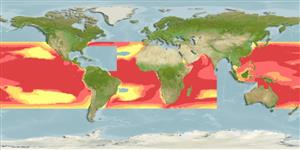分類 / Names
俗名 | 同種異名 | Catalog of Fishes(屬, 種) | ITIS | CoL | WoRMS | Cloffa
Elasmobranchii
板鰓亞綱 (鯊魚與魟魚) (sharks and rays) >
Lamniformes (Mackerel sharks)
鼠鯊目 (Mackerel sharks) >
Pseudocarchariidae (Crocodile sharks)
擬錐齒鯊科 (Crocodile sharks)
Etymology: Pseudocarcharias: pseudo-, from pseudes (Gr.), false, proposed as a subgenus of Carcharias (Odontaspididae). (See ETYFish); kamoharai: In honor of ichthyologist Toshiji Kamohara (1901-1972), Kochi University, who secured type at a fish market and presented it to Matsubara. (See ETYFish).
Environment: milieu / climate zone / depth range / distribution range
生態學
海洋; 海洋洄游的 (Ref. 51243); 深度上下限 0 - 590 m (Ref. 6871), usually 0 - 200 m (Ref. 54740). 亞熱帶的; 40°N - 40°S, 180°W - 180°E
Tropical and subtropical waters of all oceans.
所有海洋的熱帶與亞熱帶水域。
Length at first maturity / 大小 / 重量 / 年齡
Maturity: Lm 91.6, range 89 - ? cm
Max length : 110 cm TL 雄魚/尚未辨別雌雄; (Ref. 43278); 122.0 cm TL (female); common length : 100.0 cm TL 雄魚/尚未辨別雌雄; (Ref. 13569)
背棘 (總數) : 0; 臀棘: 0. A medium-sized spindle-shaped shark with very large eyes lacking a nictitating membrane, long gill slits extending onto dorsal surface of head, lanceolate teeth, weak keel and precaudal pits on caudal peduncle (Ref. 6871, 43278). Small and low dorsal fins, with second dorsal fin less than half the size of the first but larger than the anal fin (Ref. 6871). Pectoral fin broad and rounded (Ref. 6871). Light or dark grey above, paler below, fins white-edged, sometimes with small white spots on body and a white blotch between mouth and gill slits (Ref. 13569).
一中等大小的紡錘形的鯊魚有非常大的眼沒有延伸到頭部背面,矛尖形的齒,弱的龍骨脊與尾前小窩的瞬膜 , 長的鰓縫在尾梗上.(參考文獻 6871,43278) 小而低的背鰭, 與第二背鰭鰭少於第一個的一半的大小但是大於臀鰭.(參考文獻 6871) 胸鰭寬的而且圓的.(參考文獻 6871) 淡灰色或深灰色的上方, 腹面灰白的, 鰭邊緣白色的, 有時有身上的小白斑與一個白色的斑塊在嘴巴與鰓縫之間.(參考文獻 13569)
An oceanic species usually found offshore and far from land but sometimes occurring inshore (Ref. 9993, 43278, 58302). Epi- and mesopelagic, with occasional near-bottom occurrences (Ref. 43278, 58302). Although considered not dangerous to people, its powerful jaws, jaw muscles and teeth invite respect. Flesh not appreciated and therefore the catch is usually discarded (Ref. 247); utilized for its large, squalene-rich liver (Ref. 9993). Feeds on small pelagic bony fishes, squids and shrimps (Ref. 5578). Ovoviviparous, embryos feeding on yolk sac and other ova produced by the mother (Ref. 50449). With 4 young in a litter, born at 40 to 43 cm TL (Ref. 12288). Maximum length for female given in Romanove et.al 1994 (Ref. 44781). Common bycatch of tuna longline fisheries, and occasionally tuna gillnet fisheries (Ref.58048).
一個大洋性的種通常發現於外海而且遠離土地但是有時出現於沿海地區.(參考文獻 9993,58302) 表層與中層帶, 偶而有接近底部的發生.(參考文獻 58302) 雖然被認為不對人類有危險性,它的有力顎, 頜肌肉與齒邀請敬意。 肉不欣賞因此捕捉通常是丟棄的;(參考文獻 247) 利用.它的大, 豐富的鯊烯肝臟.(參考文獻 9993) 吃小型大洋性魚類硬骨魚類,烏賊與蝦。 (參考文獻 5578) 卵胎生的, 胚胎吃產生於母親的卵黃囊與其他的卵.(參考文獻 50449) 有四個幼魚在 40 到 43 公分TL 出生的一胎.(參考文獻 12288) 最大的母魚體長記錄在 Romanove et.al 1994.(參考文獻 44781)
Exhibit ovoviparity (aplacental viviparity), with embryos feeding on other ova produced by the mother (oophagy) after the yolk sac is absorbed (Ref. 50449). With 4 young in a litter, born at 40-43 cm (Ref. 11228).所有海洋的熱帶與亞熱帶水域。
Compagno, L.J.V., 1984. FAO Species Catalogue. Vol. 4. Sharks of the world. An annotated and illustrated catalogue of shark species known to date. Part 1 - Hexanchiformes to Lamniformes. FAO Fish. Synop. 125(4/1):1-249. Rome, FAO. (Ref. 247)
IUCN 瀕危狀態 (Ref. 130435)
無危 (LC) ; Date assessed: 09 November 2018
人類使用
漁業: 低經濟
工具
特別的報告
下載 XML
網路資源
Estimates based on models
Preferred temperature (Ref.
123201): 16.3 - 28.2, mean 24.9 °C (based on 3402 cells).
Phylogenetic diversity index (Ref.
82804): PD
50 = 1.5000 [Uniqueness, from 0.5 = low to 2.0 = high].
Bayesian length-weight: a=0.00389 (0.00180 - 0.00842), b=3.12 (2.94 - 3.30), in cm total length, based on all LWR estimates for this body shape (Ref.
93245).
營養階層 (Ref.
69278): 4.5 ±0.58 se; based on food items.
Generation time: 8.0 ( na - na) years. Estimated as median ln(3)/K based on 1
growth studies.
回復力 (Ref.
120179): 非常低的, 最小族群倍增時間超過14 年 (tm=5.1; K=0.14; tmax=13; Fec=4).
Fishing Vulnerability (Ref.
59153): High to very high vulnerability (66 of 100).
